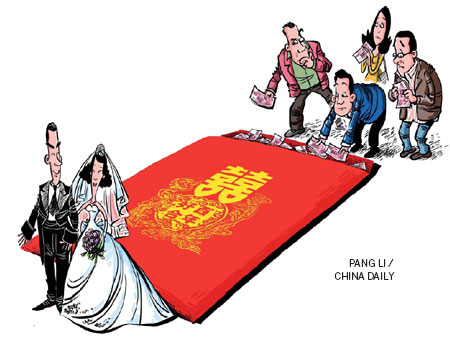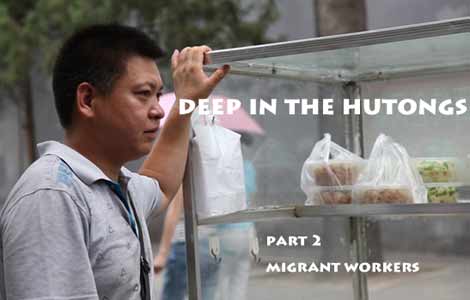It's not thought, but cash, that counts
Updated: 2013-10-11 09:56
By Raymond Zhou (China Daily)
|
|||||||||||
A crucial part of a modern Chinese wedding obliges guests to hand over money
The National Day golden week is a golden time for weddings. Chinese often rely on a special calendar to find out the auspicious days for certain ceremonies such as weddings, but a seven-day holiday has got to be doubly propitious when everyone has plenty of spare time and the weather is at its seasonable best. I, for one, ran into a dozen new couples taking photos for wedding albums on just one trip to a park.
However, if you receive a dozen wedding invitations, you may not count your blessings. Instead, you need to count the bills in your wallet. You may have to shell out as much as a month's salary just to be in attendance. According to one media survey, up to 80 percent of Beijing residents were invited to at least one wedding during the just finished golden week, and they all had to give a red envelope containing some cash in lieu of a wedding present.
No wonder people are complaining about receiving wedding invitations, which are jokingly called "red bombs".
I did a little research on the amount in a typical red envelope. For a casual friend or regular colleague, it is 100-200 yuan ($16-$32; 12 euros-24 euros); for someone closer, it can edge up to 300-500 yuan; and for a "best buddy", it should be no less than 600 yuan. Of course, it can vary by region and social strata. Among those surveyed, 45 percent gave 500 yuan or less; 32 percent reported cash gifts of 500-1,000 yuan, and 11 percent fell into the generous group of 2,000 yuan or more.
You may wonder why someone ringing wedding bells would want to invite "regular friends" who, without the embellishment in addressing, are probably only casual acquaintances. The trick is in the economics. The cost of wining and dining a wedding guest is usually lower, sometimes much lower, than the amount of gift money received. So, the larger the wedding banquet, the more profitable it is for the ones who throw it. On top of it, you gain bragging rights and vanity that ordinary people - those not in the public spotlight - do not have many chances for.

According to media reports, Ma Linxiang, a village chief in Beijing, gave a party with 250 tables for the banquet alone, lasting three days, from Oct 4 to Oct 6, for his son's wedding. He even rented the banquet hall of the National Conference Center. The price tag is said to have been 1.6 million yuan, including 700,000 yuan for live entertainment with celebrity participants. But it all came at much greater cost to Ma than that. It was subsequently reported that he had been sacked for his "extravagant waste". He was quoted as saying he "couldn't stop" the bride's family from splurging on the venue as well as the troupe of performers.
Strangely, what was in the red envelopes ranged from 500 yuan to 2,000 yuan, enough to cover the catering, but not the whole event. Well, you cannot compete with the rich and powerful for this kind of thing. They have their own arithmetic, but they certainly blaze new trails in expanding the parameters for an enviable lifestyle.
Now I have to add that one wedding does not a millionaire make. Let's suppose you send out a dozen invitations to your colleagues and a dozen to your friends. The recipients are probably in your own age bracket, and those still single today may tie the knot tomorrow. So, you'll receive their wedding invitations and have to reciprocate the gift money. Your relatives may fluctuate widely in age, but your uncles and aunts have children of their own. Sure, you can invite only friends who were already married when you got to know them, but then it's not a business after all.
Before you denounce the practice of giving cash as wedding gifts as a token of materialism, let me explain how relieved I was when I first heard of it. In the late 1970s and early 1980s, people still gave real gifts, at least in my circles. Youngsters of that time would find out what the bride and the groom would need most, sometimes by asking them outright, and save them the expense by buying that item for them. People would focus on the necessities, which made sense in an age of low income and little luxury. I remember in my town so many people would buy quilts and blankets that some wedding chambers would have brightly colored beddings stacked to the ceiling. I guess the gift givers forgot to coordinate in advance.
Economically speaking, a young couple starting out in life would need all the help they can get assuming they are not born with silver spoons in their mouths and cash would not result in the kind of waste such as redundant items. They could use the money for whatever purpose they deem necessary. So it is the most efficient way.
But cold, hard cash has a way of subverting the mechanisms of human interaction. There have been reports of lower-level officials using their children's weddings as opportunities to amass considerable wealth. Just imagine who would dare turn down an invitation by someone giving the green light to your project, and who in his right mind would not give the socially accepted upper limit while reasonably keeping the phantom of bribery at bay. For ordinary people, who would want to risk undervaluing their friendship with you by giving a few hundred yuan less?
Traditionally, Chinese society is woven together by human bonds. People would give an arm and a leg for their family members, fellow villagers and "blood brothers", friends so close as to attain the loyalty typical in a blood relation. Employers would treat their employees like a family and would not fire someone unless the business is going under, and in turn, employees were expected to show nothing but loyalty. Nowadays, human dynamics of that intensity are seen only in gangster movies, which preserve the glamour of family-like allegiance to one another.
Of course, we tend to romanticize the old days. But the flourishing of the free market has definitely chipped away at old values. Just two decades ago, I would spend many weekends helping friends move. It was an endeavor into which friends were supposed to chip in time and sweat. That's what a friend is for. No money was expected to change hands over this. But today who would be foolish enough to ask friends and colleagues to help move bulky furniture while so many businesses offer this service at a reasonable price? Perhaps you would spend more if you count in the meal you would take them to afterwards.
As our society gains more wealth, human connections become more efficient and the lubricant of making small talk, hanging around and offering help gradually fade in relevance. Much of what we need from friends can be bought on the open market, including such intimate tasks as disclosing personal secrets. A shrink can do it better than a friend, and with more impartiality, or so we are told. We have always had the term "the debt of personal favors" and now more and more of our friendly favors can indeed be measured in yuan.
In a way, a standard of gift money for a wedding is like going Dutch for a group dinner. There are etiquettes that differ with each culture, but one should have the freedom to opt out or, in the case of inability to give the right amount, have the more affluent guests pick up the tab. It is also a way of helping out. So, I'm torn about the ubiquitous red envelope in China and whether it has brought more harm than benefits.
Contact the writer at raymondzhou@chinadaily.com.cn

(China Daily European Weekly 10/11/2013 page30)
Today's Top News
Senate leader 'confident' fiscal crisis can be averted
Riding the wave of buy-ups
Working group to discuss sea issues
Chinese firm joins UK airport enterprise
Disaster response gets a helping hand
Have yuan, will travel far and wide
Draft regulation raises fines for polluters
Communities give care for elderly
Hot Topics
Lunar probe , China growth forecasts, Emission rules get tougher, China seen through 'colored lens', International board,
Editor's Picks

|

|

|

|

|

|





